‘WURD Is Not a Mouthpiece,’ Says Station’s CEO
Statement from Station CEO Sara Lomax
Harris Riffs on Trump at Essence Festival
In Cuba, Repression Awaits Independent Journos
CNN’s Victor Blackwell reports on WURD host Andrea Lawful-Sanders’ interview with President Biden, which drew criticism when she used questions supplied by the Biden-Harris campaign. (Credit: YouTube)
‘WURD Is Not a Mouthpiece,’ Says Station’s CEO
“The Philadelphia radio host who said she used questions prepared by President Joe Biden’s campaign in one of his first postdebate interviews has left the station, WURD Radio’s president and CEO announced Sunday,” Gillian McGoldrick reported for the Philadelphia Inquirer.
“Andrea Lawful-Sanders, who hosted The Source on WURD 96.1 FM/900 AM, has agreed to leave the station after saying on CNN that she had received a list of eight questions from the Biden campaign, four of which she approved and used in her interview with Biden.”
William Earl added for Variety, ” Given the swirl around Biden and his fitness for office at age 81, the revelation that Lawful-Sanders and others agreed to such highly irregular interview terms contributes to the perception that mainstream and liberal news media outlets have sought to shield Biden’s age-related problems from the public.”
McGoldrick also wrote, “Biden, who is facing questions about whether he should continue as the Democratic presidential nominee following his poor debate performance, appeared on Black radio shows in Pennsylvania and Wisconsin last week to discuss his policy accomplishments and show voters he is prepared to complete another term. But Lawful-Sanders and a Wisconsin host, Earl Ingram, both said they had been given predetermined questions by Biden’s campaign as a condition of the interviews.
“ ‘It’s not at all an uncommon practice for interviewees to share topics they would prefer,’ Biden campaign spokesperson Lauren Hitt said in a statement to the Washington Post. She added that agreeing on topics in advance was not a prerequisite of the interview.
“Hitt told the Post the questions ‘were relevant to news of the day — the president was asked about his debate performance as well as what he’d delivered for Black Americans. We do not condition interviews on acceptance of these questions, and hosts are always free to ask the questions they think will best inform their listeners.’
“Two sources familiar with the Biden campaign’s booking operation also told the Post the campaign will not continue the practice of offering ‘suggested questions.’
“Lawful-Sanders arranged the interview, including the prewritten questions, without the knowledge of WURD management, which ‘violates our practice of remaining an independent media outlet accountable to our listeners,’ wrote Sara M. Lomax, the president and CEO of WURD Radio. Lawful-Sanders’ separation from the station is effective immediately.
WURD’s interview with Biden remained online Sunday, but has since been removed.
“ ‘This is something we take very seriously,’ Lomax added in the statement. ‘Agreeing to a predetermined set of questions jeopardizes that trust and is not a practice that WURD Radio engages in or endorses as a matter of practice or official policy.’
CNN’s Victor Blackwell asked Lawful-Sanders during an interview if the questions were given to her by the White House, noting the similarity of questions asked by her and other Black hosts who interviewed Biden. She confirmed she had been given a list of several questions, and the four she asked were the ones she approved from the campaign.
The effort by the Biden campaign to offer access — but require the hosts to use prewritten, predetermined questions — in order to interview Biden delegitimizes Black media, Lomax wrote in her lengthy statement.
“ ‘WURD Radio is not a mouthpiece for the Biden or any other Administration,’ Lomax added. ‘This is essential as Black Philadelphians gear up to be a pivotal player in one of the most consequential elections of our lifetime.’ ”
Statement from Station CEO Sara Lomax
Accountability, Access and a Path Forward: Why Black Media Matters
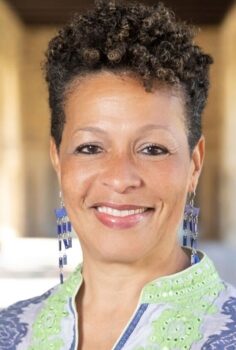 On July 3, the first post-debate interview with President Joe Biden was arranged and negotiated independently by WURD Radio host Andrea Lawful-Sanders without knowledge, consultation or collaboration with WURD management. The interview featured pre-determined questions provided by the White House, which violates our practice of remaining an independent media outlet accountable to our listeners. As a result, Ms. Lawful-Sanders and WURD Radio have mutually agreed to part ways, effective immediately.
On July 3, the first post-debate interview with President Joe Biden was arranged and negotiated independently by WURD Radio host Andrea Lawful-Sanders without knowledge, consultation or collaboration with WURD management. The interview featured pre-determined questions provided by the White House, which violates our practice of remaining an independent media outlet accountable to our listeners. As a result, Ms. Lawful-Sanders and WURD Radio have mutually agreed to part ways, effective immediately.
WURD Radio remains an independent voice that our audience can trust will hold elected officials accountable. As Pennsylvania’s only independent Black-owned talk radio station, WURD Radio has cultivated that trust with our audience over our 20-year history. This is something we take very seriously. Agreeing to a pre-determined set of questions jeopardizes that trust and is not a practice that WURD Radio engages in or endorses as a matter of practice or official policy.
Earlier this year when WURD Radio was invited to the White House on February 26 to host a day-long live broadcast featuring interviews with cabinet secretaries and other high-ranking officials, we agreed with the explicit understanding that we were not constrained to their suggested topics or talking points. We were clear that our hosts would ask difficult and provocative questions of their own determination based on the needs and interests of WURD’s listening audience — Black Philadelphians. This is a hallmark of WURD Radio’s local, state and national coverage, day in and day out.
Black media has a long history of advocating for the interests of the Black community dating back to 1827 when the first Black newspaper, Freedom’s Journal, was founded. Our outlets deserve to have a seat at the table especially because mainstream media has historically ignored, marginalized and stereotyped Black people in their coverage. A recent Pew Research Report examining Black Americans’ experiences with the news found “almost two-thirds of Black adults (63%) say news about Black people is often more negative than news about other racial and ethnic groups.” (From Variety)
- Zeeshan Aleem, MSNBC: Biden’s Democratic wall of support is cracking and unstable
- Jenice Armstrong, Philadelphia Inquirer: So, what is a ‘Black job’ anyway? Asking for me.
- Charles M. Blow, New York Times: Forcing Biden Out Would Have Only One Beneficiary: Trump
- Jamelle Bouie, New York Times: Why Republicans Are Talking About Biden’s ‘Dictatorship’ (June 25)
- Jamelle Bouie, New York Times: Mr. President, Your Get-Out-of-Jail-Free Card Is Ready
- Cary Clack, San Antonio Express-News: Biden or Harris will be at the top of the Democratic ticket in November
- Jarvis DeBerry, MSNBC: The reason Black voters say Trump should drop out won’t surprise anybody but him
- Editorial, Philadelphia Inquirer: To serve his country, Donald Trump should leave the race
- Editorial, Philadelphia Inquirer: The lingering focus on Biden’s shaky debate obscures Trump’s major verbal miscues
- LZ Granderson, Los Angeles Times: The debate showed Biden and Trump are terrible choices, but not equally terrible
- Emil Guillermo, Asian American Legal Defense and Education Fund: My 100-year-old mentor helps me understand aging and the Presidential question
- Harold Jackson, Philadelphia Inquirer: The most important takeaway from presidential debates? It’s time to end them.
- Roy S. Johnson, al.com: What’s a ‘Black job?’ Here are 99 we proudly hold and conquer
- Roy S. Johnson, al.com: With deference to Frederick Douglass, what to a discordant nation is this 4th of July?
- Ruben Navarrette Jr., syndicated: Biden and Trump have something in common: They both lost an embarrassing debate
- Clarence Page, Chicago Tribune: The sad reality? Biden needs to make way for another Democratic nominee
- Eugene Robinson, Washington Post: Biden’s 2024 survival requires a lot more than hope
- Kimberly Atkins Stohr, Boston Globe: Biden dropping out is a fantasy. Democrats can win — if they fight.
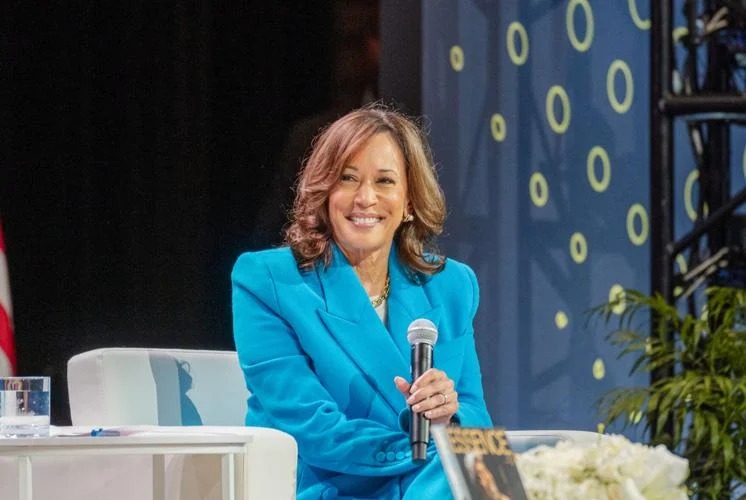
“In 122 days, we each have the power to decide what kind of country we want to live in,” Vice President Kamala Harris said at the Essence Festival of Culture. (Credit: Matthew Perschall/NOLA.com)
Harris Riffs on Trump at Essence Festival
“As President Joe Biden tries to revive his embattled reelection bid, Vice President Kamala Harris led a parade of Black Democrats who warned Saturday that the threat of another Donald Trump presidency remains the most important calculation ahead of November,” Bill Barrow reported Sunday for the Associated Press.
“Yet in more than 20 minutes on stage at the Essence Festival of Culture, Harris did not acknowledge Biden’s dismal debate performance or calls for the 81-year-old president to end his reelection bid. In fact, she barely mentioned Biden at all – a stark contrast to the Congressional Black Caucus members who forcefully and repeatedly defended the president by name.”
“ ‘This is probably the most significant election of our lifetime,’ Harris said, before riffing on Trump musing about being a dictator, pushing the Supreme Court rightward and promising retribution on political enemies. ‘In 122 days, we each have the power to decide what kind of country we want to live in.’ . . . “
Dylan Wells, with contributions from other Washington Post writers, added, “At a panel earlier in the day, members of the Congressional Black Caucus pledged loyalty to Biden while lavishing praise on Harris.
“ ‘People are talking about “Biden is too old” — hell, I’m older than Biden,’ Rep. Maxine Waters (D-Calif.), 85, said to a standing ovation. ‘And I get up every morning. And I exercise. And I work late hours. I take care of Black people. Trump has told you who he is, he defined himself. He is a no good, deplorable, lying, despicable human being.’
“ ‘No matter what anybody said, it ain’t going to be no other Democratic candidate. It’s going to be Biden,’ Waters added. . . .”
The Essence Festival, an outgrowth of Essence magazine, is a prime example of how publications can spin off products to boost their bottom lines. In 2015, Joe Ripp, then CEO of Time Inc., said the festival in New Orleans earned more money than the magazine made in a year.
“The nation’s largest annual celebration of Black culture was set to end Sunday with musical performances by Janet Jackson and a special tribute to Frankie Beverly & Maze, the soul band that closed the event for the festival’s first 15 years. Beverly, now 77, has said he is stepping away from performing live, and the group has been on a farewell tour,” Chevel Johnson Rodrigue reported for the Associated Press.
“Others scheduled to perform included Victoria Monét, Teedra Moses, Tank and the Bangas, Dawn Richard, SWV, Jagged Edge, Bilal and Anthony Hamilton.
“Barkue Tubman-Zawolo, chief of staff, talent and diasporic engagement for Essence Ventures, told The Associated Press the festival helps connect the global Black community.
“ ‘Historically, as Black people, sometimes we’re not sure where our heritage comes from,’ Tubman-Zawolo said. ‘America is just one place. But within America there’s a melting pot of different Black cultures: Africa, Latin, Europe, the Caribbean. Understanding that allows our power to be even greater.’ “
The Essence Festival brought in an estimated $327 million in economic impact to New Orleans in 2022 and created more than 3,600 jobs, according to a recent study conducted by Dillard University, Desiree Stennett reported for NOLA.com.
“The Essence Festival of Culture is celebrating 30 years of providing several days of Black culture, entertainment and music,” wrote columnist Will Sutton.
- Kerane Marcellus, Essence: Essence Festival 2024 Street Style Moments–Day 1
- Kerane Marcellus, EFOC 2024 Street Style Moments–Day 2
- Robyn Mowatt, Essence: Celebrity Style Moments From Night 2 Of Essence Festival
- Keith Spira, NOLA.com: R&B leading men Usher and Charlie Wilson topped the second night of the 2024 Essence Festival
- Shelby Stewart, Essence: Janet Jackson Shares Her Love for New Orleans Ahead Of Essence Festival Performance
- John Whitehouse, Media Matters for America: Fox News ramps up attacks on Vice President Kamala Harris
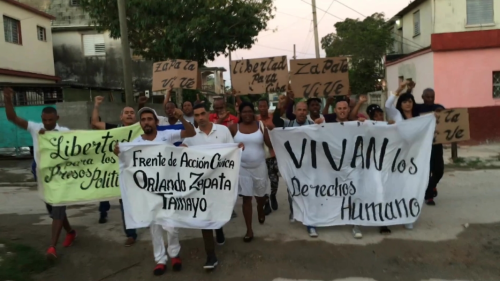
Activists walk the streets of Havana, 2018 (Credit: Enrique Díaz)
In Cuba, Repression Awaits Independent Journos
Serafín Morán, an independent Cuban journalist who obtained asylum in the United States in 2018, explained to Journal-isms last month some ways in which these journalists evade repression. Here is another view.
By Julio Antonio Rojas, in Havana (pictured)
 Enrique Díaz is a reporter for the independent media outlet CubaNet who, like many independent journalists on the island, finds inventive ways to do his job in this communist country, where the regime controls all the media through State Security.
Enrique Díaz is a reporter for the independent media outlet CubaNet who, like many independent journalists on the island, finds inventive ways to do his job in this communist country, where the regime controls all the media through State Security.
That may mean working with citizens who also oppose the excesses of the state. Some volunteer to lend Díaz the use of their homes. He and others teach these collaborators how to film an eviction or a police beating without being seen by the military.
These journalists risk painful consequences. In 2014, an elderly woman threw acid in Díaz’ eyes for reporting the rape of a minor. The police do not want these violations reported, to give the impression that these crimes do not exist in Cuba.
 Díaz (pictured) was admitted to the hospital. Thank God he did not lose his vision, but the woman who threw the acid was rewarded with a diploma of distinction by the local Committee for the Defense of the Revolution, neighborhood committees created to monitor dissidents.
Díaz (pictured) was admitted to the hospital. Thank God he did not lose his vision, but the woman who threw the acid was rewarded with a diploma of distinction by the local Committee for the Defense of the Revolution, neighborhood committees created to monitor dissidents.
Independent journalists work under the accusatory and repressive gaze of the Cuban regime, but they have not stopped doing their work. It is difficult to say how many independent journalists there are, but The Guardian reported last year: “Independent journalism in Cuba — usually supported by foreign funding — has blossomed since 2018, the year the state punctured its monopoly on information by unleasing relatively uncensored mobile internet.”
However, the Guardian’s Ed Augustin also reported that Cuban authorities were cracking down.
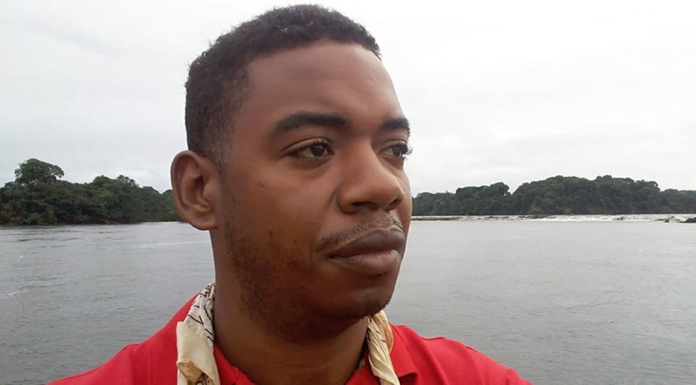 Serafín Morán (pictured), an independent Cuban journalist who obtained asylum in the United States in 2018, explained to Journal-isms last month some ways in which these journalists evade repression (scroll down).
Serafín Morán (pictured), an independent Cuban journalist who obtained asylum in the United States in 2018, explained to Journal-isms last month some ways in which these journalists evade repression (scroll down).
“When journalists are in the streets looking for news and videos, they are detained by the Cuban regime, they scan the [computer] memories where they keep the videos and there are times when they swallow [them] so as not to be stripped of their work,” he wrote. “They spend days in prison just for working as [journalists] and when they manage to emerge from the darkness they spread the little news they obtain.”
Díaz shows us other ways these journalists work, but also exemplifies the sanctions that can be imposed.
There was the time Díaz covered a peaceful protest by the Orlando Zapata Tamayo Civic Action Front in front of the Capitol in Havana.
The next day his home was raided by State Security. They beat him and took his work belongings.
Being an independent journalist in Cuba makes one a constant target of attacks by the dictatorship. It not only affects our physical and psychological security but also that of our family and friends.
The authorities declare that murders of journalists do not occur in our country, unlike in Mexico or Colombia.
The difference is that in Cuba the attack on the independent press is state policy. They don’t kill us because they know that image is very important. Therefore, they work on physical and psychological exhaustion to make us give up on our work or opt for exile. It’s about killing ourselves in life.
Díaz explains that he does not plan to leave independent journalism because he has seen the fruits of his
work.
When neighbors turn to independent journalists and report cases of government administrative corruption, the Political Police investigate to see whether it is true or a lie from the reporter. When it is true, in the majority of cases they force the authorities to provide a quick solution to the problem.
Díaz tells me that he would like to see truly free journalism in Cuba, without any type of censorship, where communicators are not spokespersons for a totalitarian party.
Until then, these independent journalists should continue to expose corruption, including by government leaders, and those leaders should be punished, as they should be under a truly democratic constitution, with free, uncensored and democratic journalism.
Julio Antonio Rojas is an independent journalist in Cuba.
- Contributor from Cuba, CubaNet: “The only thing we have received is torture,” denounces political prisoner of 11J
- César López Linares, LatAm Journalism Review: Cuban journalist Lázaro Yuri Valle Roca, recently freed and in exile in the US, tells story of his three years in detention
New WaPo Editor Ready to Home In on Diversity
July 5, 2024
Anxious Staff Should ‘Keep Eye on the Long Ball’
‘Press Freedom in Black-Run Countries’ Set Aug. 1
[btnsx id=”5768″]
Donations are tax-deductible.
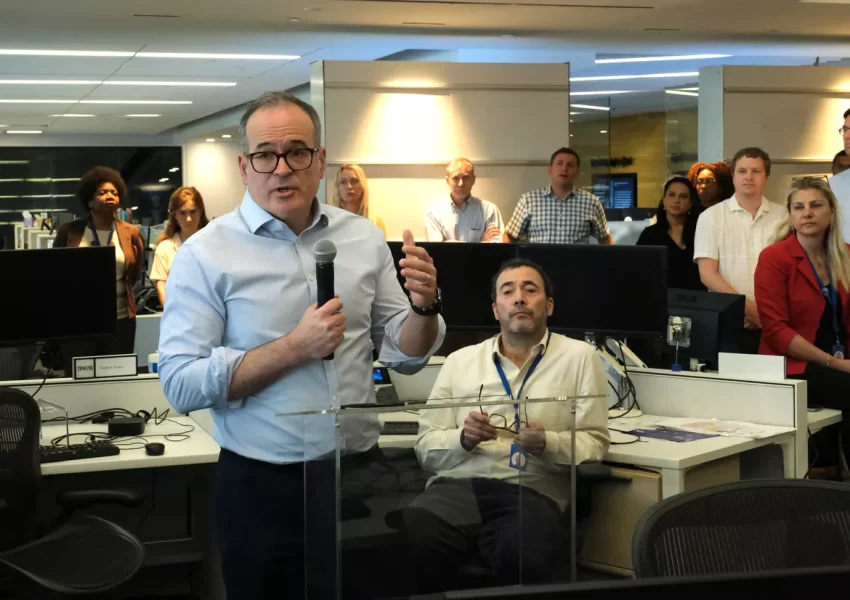
Matt Murray addresses the Washington Post news staff on June 3. (Credit: Robert Miller/Washington Post)
Anxious Staff Should ‘Keep Eye on the Long Ball’
The Washington Post’s new editor, Matt Murray, says “there are not enough women and people of color in leadership positions,” that the news organization needs to do better in seeking out diverse audiences, and that he was “slightly surprised to find that jobs at the Post are not always posted transparently.”
Murray, beginning his fifth week on the job, also said that he had no issues with Will Lewis, the Britisher hired as Post publisher and CEO who has been the subject of multiple news stories questioning his ethics, when the two worked together. But Murray acknowledged that his onetime Wall Street Journal coworker still has to win over the Post newsroom.
While “it’s a hard situation for the newsroom when things feel uncertain, and these days in media as I think we all know . . . your competitors are happy to beat up on [you in] different ways” — I think that the only way you can generally proceed the best you can for most people in most cases is . . . don’t read the stories about yourself too closely and keep going and keep your eye on the long ball.”
Murray, former editor-in-chief at The Wall Street Journal, appeared Monday before the Journal-isms Roundtable in his first appearance before outsiders since his June 2 appointment. Several Post alumni were on the Zoom call.
Addressing a complaint from many locally who have watched the Post become more of a digitally focused, internationally read publication under owner Jeff Bezos, Murray told the group, “I would say as a reader and somebody who grew up in D.C., I definitely don’t feel that there’s a deep enough ownership and diving into sort of the rich, long, deep culture of Washington in all kinds of ways, Washington and the surrounding areas.
“And there’s certainly opportunity for us to do that there. I think. Thinking about what the Post is and who it speaks to and how [it] gets there is one of the jobs that’s been hanging over there for a long time.”
Sixty-five people participated in the Zoom call. Short and long versions of the YouTube video had drawn 173 views by Thursday. (Credit: YouTube)
Sixty-five people participated in the Zoom call. In addition to Murray, the session featured remembrances of Merv Aubespin, the Louisville, Ky.-based fifth president of the National Association of Black Journalists who died June 26; a presentation by Shirley Carswell, executive director of the Dow Jones News Fund who this summer introduced a Black Male Journalism Workshop with and at New York University; a toast to Gary Lee, the Oklahoma Eagle managing editor who is receiving an NABJ award as its 2024 “Journalist of Distinction”; and a discussion by members of the team that produced the podcast series “40 Acres and a Lie,” in which their “historical investigation found 1,250 formerly enslaved Black Americans who were given land – only to see it returned to their enslavers.”
Murray, 58, is to serve only temporarily as executive editor, Lewis announced June 1. After Election Day, he was to hand over the reins of leadership for the newsroom’s core reporting areas — including politics, investigations, business, technology, sports and features — to Robert Winnett, a British journalist who is deputy editor of Telegraph Media Group.
However, Winnett decided not to take the Post job, his company announced June 21, after Lewis and Winnett faced accusations of having used unethical newsgathering practices in Britain, where newsrooms sometimes operate by different rules from their American counterparts.
Still, Murray intends to proceed with his post-election plans to head a “third newsroom,” which he defined as “a way to think about innovation and new audiences and going off platform, and finding new ways to bring the Post to different kinds of readers and groups.” Under this “reinvention,” the opinion section is the “second newsroom.”
“I can tell you that the belief I think of the owner and management of The Washington Post is that we can reach many, many, many, many millions more people with products and clever ways of getting out there,” Murray said. “So I’m hopeful that also we can find ways in the third newsroom to broaden the range and voices in our content quite a bit and take that further than it’s gone now.”
Responding to a question about the Post’s use of artificial intelligence, Murray said, “We are gonna have a new thing that you’ll see next week, a climate bot.
“And the idea is you type in your climate questions and using AI, it gives you an answer. The answer comes from all works that our journalists have done.
“So it’s all taken from their work. So hopefully people like the service, but I’ll tell you, it ain’t perfect.”
When Murray and Lewis met with Post staffers after the news of their hiring, media critic Margaret Sullivan, echoing the pointed questions of some Post journalists, satirized the hiring announcement as, “Each of our three newsrooms will be led by an outstanding white male, which we feel is especially appropriate in Washington DC. If these three newsrooms are successful, we will consider a fourth and fifth.”
Murray told the Roundtable group he considered the question of diversity “the elephant in the room.”
A Post report dated June 30, 2023, showed 44.1 percent of the news and editorial staffers were male and 55.2 percent female.
By race and ethnicity, the staff was: white, 62.6 percent; Black or African American, 9.7 percent; Asian 9.0 percent; Hispanic or Latino, 6.1 percent; multiracial, 3.7 percent; Native American, 0.2 percent; Native Hawaiian or other Pacific Islander, 0.1 percent; did not disclose, 8.7 percent.
A 2022 study from the Washington Post Guild found that “While the company has made progress over the past few years in implementing several diversity and inclusion initiatives, there is still work to do.”
The Guild called for an equity, diversity and inclusion consultant, a diversity committee, and for the Post to “commit to ensuring that the finalists brought in for interviews include at least one candidate from an underrepresented background.”
The union also said, “Often, our framing and selection of stories is designed mostly with a predominantly White readership in mind at the expense of communities of color. For example, our local coverage must capture the nuance and complexity, in particular, of the Black community in the DMV region,” referring to the District of Columbia, Maryland and Virginia.
Murray said much the same. “There are not enough women and people of color in leadership positions,” he told the Roundtable.
“There’s a good pipeline. There’s a lot of deputies. There’s people coming up, but I hope in a restructuring we can create some more opportunities for leadership roles.
“I’ve gone into meetings and seen again, deputies and number twos. I think also, and there’s a couple of people on this call who could tell you some things we did in the past when I was at The Wall Street Journal. . . . Every job was open and every hiring manager at every situation had to consider women and people of color in a job.
“That didn’t always mean that they had to hire but we needed a justification for why. We wanted to make sure the pipeline was strong, so there’s some basic practices that way that the Post needs to more fully embrace. I don’t say that with any criticism of the recruiting team, by the way. . . .”
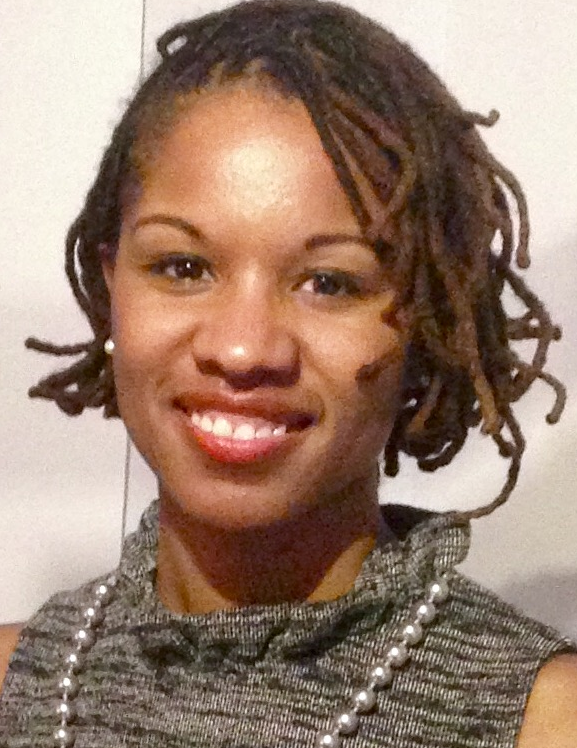 Former Executive Editor Marty Baron appointed Krissah S. Thompson (pictured) managing editor for diversity and inclusion in 2020, and then-Executive Editor Sally Buzbee named Jason Murray (pictured, below) sports editor a year ago. Both are African American.
Former Executive Editor Marty Baron appointed Krissah S. Thompson (pictured) managing editor for diversity and inclusion in 2020, and then-Executive Editor Sally Buzbee named Jason Murray (pictured, below) sports editor a year ago. Both are African American.
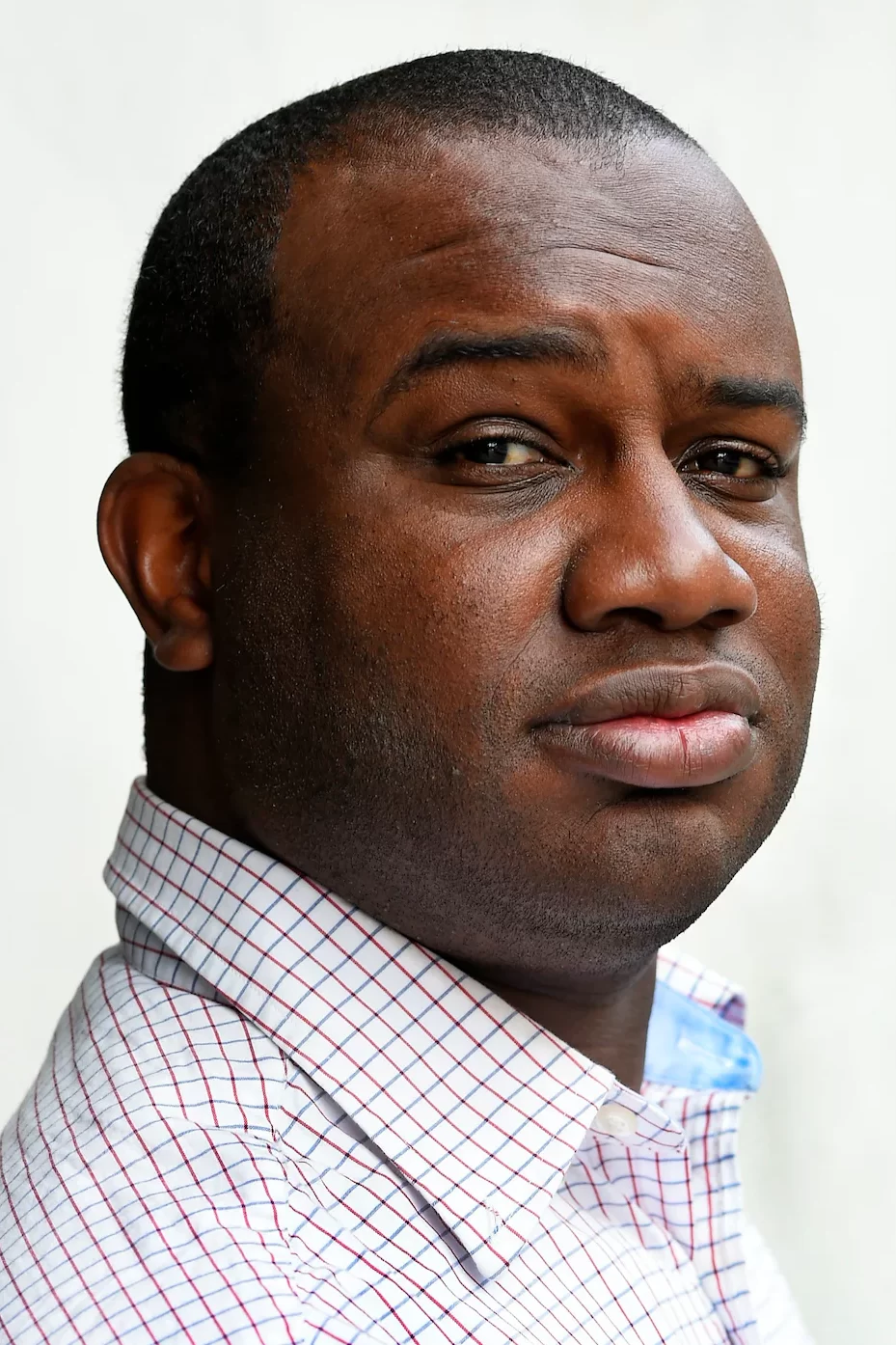 Nevertheless, Murray said, “The Post has more work to do. The whole process of people’s careers, you know, and meaning career pathing, helping with career development, helping with career training.
Nevertheless, Murray said, “The Post has more work to do. The whole process of people’s careers, you know, and meaning career pathing, helping with career development, helping with career training.
“A lot of these organizations these days are doing a pretty good job on the recruiting end and then they can have a couple of people of color and at very top jobs, but in the middle of the newsroom career for various reasons, they lose people.
“They don’t keep them engaged. They don’t keep them inspired. We have to do a better job of career pathing and helping people develop.”
Dana Priest, veteran Post journalist who asked Murray about Lewis, summed up the feelings of many when she messaged afterward that while Murray was vague on some points, he was “very much [more] like an objective newspaper editor than a loyal executive. Impressive. I liked his manner a lot. Not so many talking points.”
Others said Murray’s answers were “multilayered” or “reassuring,” though they sometimes lacked specifics.
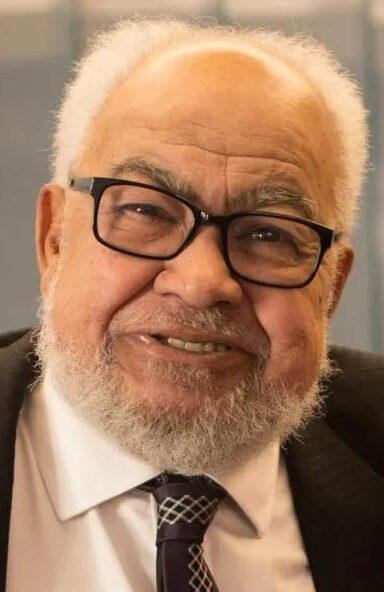 During the opening remembrances of Aubespin (pictured), Michael Days, a retired masthead editor at the Philadelphia Inquirer, cited Aubespin’s warm, down-to-earth manner and recalled that in the 1980s, “nobody really talked about diversity, inclusion and those kinds of terms in those days, but there were a number of organizations, including the Courier-Journal, which really seemed to be committed to making some inroads, and Mervin was a champion of making sure that newsrooms began to be diverse.”
During the opening remembrances of Aubespin (pictured), Michael Days, a retired masthead editor at the Philadelphia Inquirer, cited Aubespin’s warm, down-to-earth manner and recalled that in the 1980s, “nobody really talked about diversity, inclusion and those kinds of terms in those days, but there were a number of organizations, including the Courier-Journal, which really seemed to be committed to making some inroads, and Mervin was a champion of making sure that newsrooms began to be diverse.”
Wayne Dawkins, who teaches at Morgan State University and is NABJ’s unofficial historian, called Aubespin a “great connector” who tripled the size of the organization in one year.
Leon Carter, editor-at-large at the Athletic who had worked at the Courier-Journal, said, “He made you feel welcome in a newsroom. But he also made you understand what it is to be Black in a newsroom and the role that you played, because I was the only African American on the sports desk. . . .”
John Yearwood, editorial director – diversity and culture at Politico, said Aubespin’s international connections through NABJ and the United Nations were often overlooked. Yearwood recalled a 1996 trip in which he, Aubespin and others visited Nelson Mandela at his home in South Africa.
The visit was so emotional that Aubespin cried on the bus afterward.
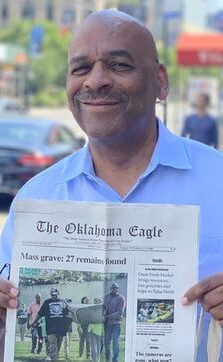 Lee (pictured), managing editor of the Oklahoma Eagle, part of the Black press, responded to the toast to him by saying in part, “what’s kind of most important for this particular distinction is the attention that it brings to two things. One is to the Black press, which is its own animal, its own creation, and plays a really significant role in American journalism. And I’m . . . happy to be part of that as managing editor of the Eagle; and also to the importance of local news, which is absorbing, it’s interesting, it’s vital.
Lee (pictured), managing editor of the Oklahoma Eagle, part of the Black press, responded to the toast to him by saying in part, “what’s kind of most important for this particular distinction is the attention that it brings to two things. One is to the Black press, which is its own animal, its own creation, and plays a really significant role in American journalism. And I’m . . . happy to be part of that as managing editor of the Eagle; and also to the importance of local news, which is absorbing, it’s interesting, it’s vital.
“And I know that there are others on this call who are also committed to that. . . . And finally, just this. . . . I look around the table here and I see lots of allies, friends, colleagues, mentors, mentees. . . . I’m really inspired by how we brought each other along over the years. And I’m looking forward to continuing that journey.”
Carswell reminded attendees that she first gave a glimpse of her idea for a Black male journalism workshop at a December 2020 Journal-isms Roundtable after she was named director of the Dow Jones News Fund.
Her idea was realized at New York University’s Arthur L Carter Journalism Institute from June 2 to 8 with 20 young Black men, many from historically Black colleges and universities.
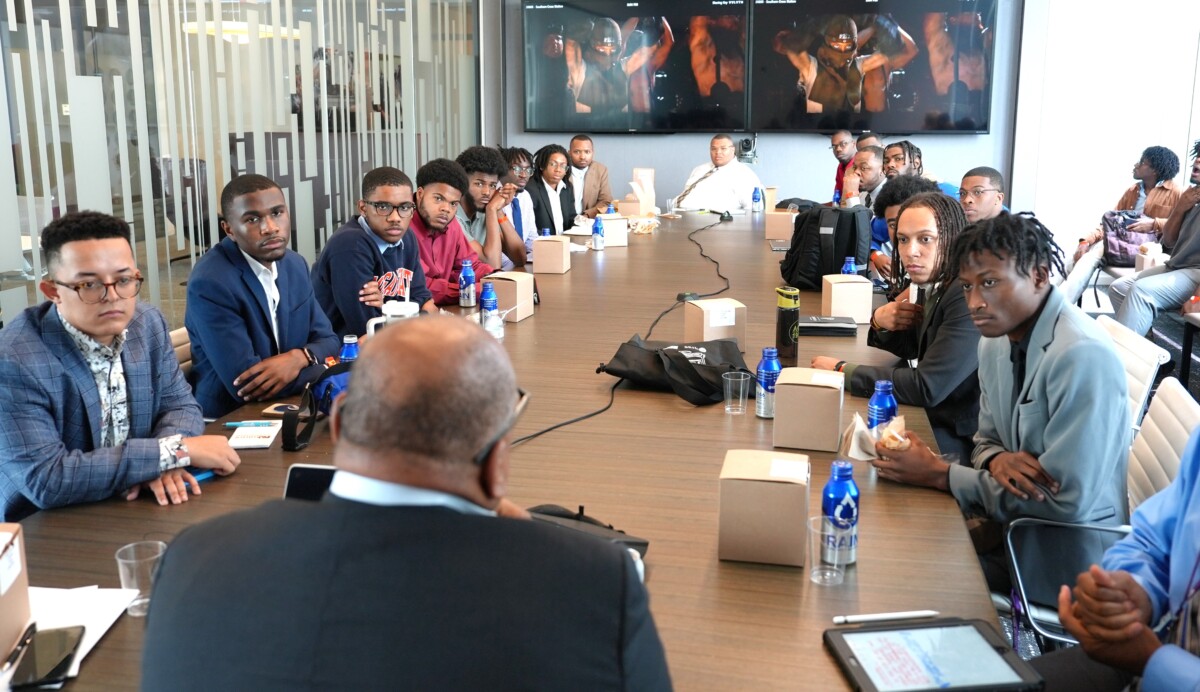
Marcus Mabry, senior vice president, digital editorial and programming at CNN, addresses Black Male Journalism Workshop students. “When have you ever seen that many Black people, period, but especially Black men, in a newsroom around the conference table?” Shirley Carswell asked. (Credit: Jason Samuels)
“There are Black men in journalism, but a lot of them are interested in sports, not necessarily news,” Carswell said. “And so this workshop was an attempt to help them secure a foothold basically in the industry.”
As Carswell showed photographs from the week, she said, “The thing that really struck everybody . . . who was involved in this workshop is just the visual of seeing 20 young Black men around the table at the New York Times conference room. . . . When have you ever seen that many Black people, period, but especially Black men, in a newsroom around the conference table? “
Carswell said the program did well in attracting well-known media figures as mentors, but needs more sponsors. The takeaway, she said, “is that, . . . we’ve got to do more to help young men come into the industry, and as Matt mentioned . . . there is this point we get them in, we can’t keep them. And so I think one of the takeaways is more career counseling, more training, more ways to help them succeed and to show them that there is a path and there is a place for them in the news industry.”
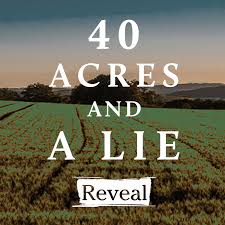
The significance of the “40 Acres and a Lie” project, Matt DeRienzo said, “will include what opening up those records can do for additional reporting by the wider community of journalists who care about it, I think.”
DeRienzo, who led the Center for Public Integrity during much of the project, said it cost “well over” $1 million in staff time, resources and salaries over 2 1/2 years. It was an outgrowth of a shift in priorities under the previous CEO, Susan Smith Richardson, to confronting inequality in the United States.
While historians and a small group of others have been writing about the reversal of the “40 Acres” promise, “what we brought was the stories,” said reporter Alexia Fernandez Campbell. “We found names. . . . We learned how to do genealogical research and we wanted to tell the stories of people who got the land and had it taken away. So to us that was kind of what we were adding to it.”
News developer Pratheek Rebala created a tool in which people will be able to search documents. The project hired a genealogist to help track down some of the descendants.
“These records like the Freedmen’s Bureau records have been really hard to . . . access even, even if you live here in Washington, D.C.,” Fernandez Campbell said.
“They’re really hard to read, you . . . need to know what to ask for because there are . . . like more than a million documents, and you know the National Archives is not going to . . . let you loose through the National Archives to look through the Freedmen’s Bureau records.”
Asked about the project’s relevance to today, Fernandez Campbell said, “We’re so conditioned to just focus on what’s happening right now, what’s happening today with the news and sometimes . . . we don’t have time to think about the connection of like why something is happening now, and that it could actually be something that . . . is based on . . . a policy or a decision made by the federal government 150 years ago.
“And I think this is an example of not only like how history is shaping the news today, like in this case . . . the Black and white wealth gap, or just the racial wealth gap in general.
“There’s so much, so many stories that haven’t been told,” she said. In the Freedmen’s Bureau archives, “There are 1.8 million records and . . . we’re focusing . . . very narrowly on the 40 Acres and a Mule program.
“We don’t even know what we don’t know . . . about stories that haven’t been told yet because historians like so many people just had trouble accessing these records, and now they’re being transcribed for the first time by . . . volunteers. . . .”
- Paul Farhi, Columbia Journalism Review: What does the Washington Post newsroom want?
- Brian Stelter, The Atlantic: The Real Story of the Crisis at The Washington Post (June 27)
‘Press Freedom in Black-Run Countries’ Set Aug. 1
Please click here for larger image of flier/poster
 The Journal-isms Roundtable will hold a panel discussion, “Press Freedom in Black-Run Countries,” in Chicago while the National Association of Black Journalists convention takes place in that city.
The Journal-isms Roundtable will hold a panel discussion, “Press Freedom in Black-Run Countries,” in Chicago while the National Association of Black Journalists convention takes place in that city.
The Roundtable will not officially be part of the convention; instead it will be hosted at the offices of Chicago Public Media on Thursday, Aug. 1, from 9 a.m. to 11 a.m. Central time. Chicago Public Media offices are on Navy Pier, at 848 East Grand Ave., Chicago, Ill., 60611.
The event is co-hosted by the NABJ Global Journalism Task Force. Those who are not in Chicago may join by Zoom. All are invited. To register for either in-person, Zoom or to watch on Facebook, please email blackruncountries (at) gmail.com.
After Black French journalist Olivier Dubois was held hostage last year for 711 days in Mali, West Africa, the press-freedom group Reporters Without Borders said, “To be a journalist in the Sahel means enduring the growing presence of radical armed groups who do not hesitate to kill reporters or kidnap them and use them as bargaining chips,” and more.
More recently, the rising authoritarianism around the world includes Africa as well as the United States. That most often means finding a way to tamp down, even silence, the press. Haiti’s existential crisis has been extensively reported, less so the state of journalism there and in the rest of the Caribbean.
Discussions about the African diaspora most often do not include press freedom, and journalism sessions in the U.S. about Black people often do not include a global view.
Panelists:
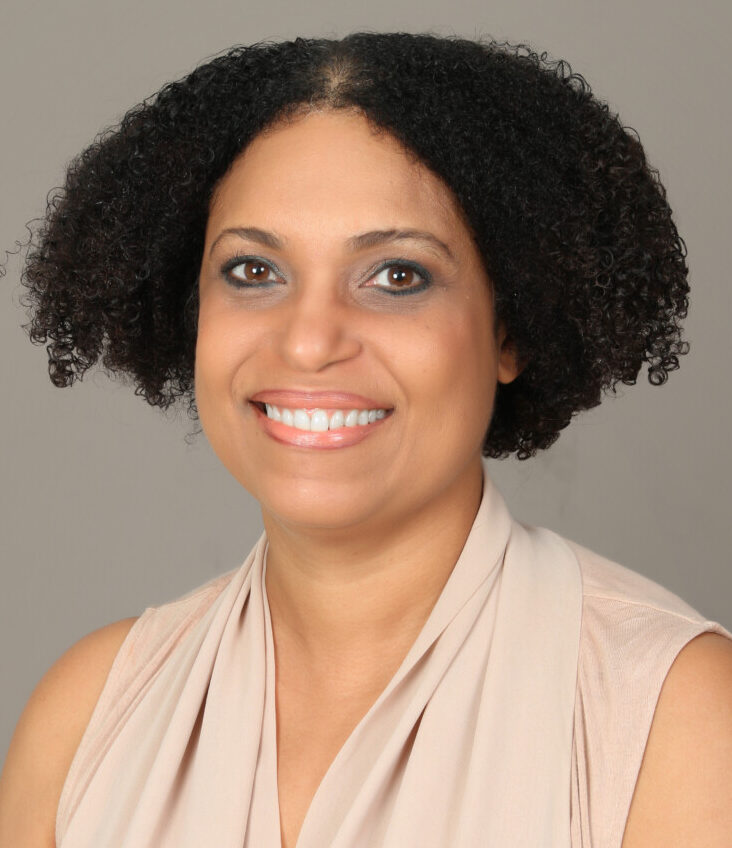 Zahra Burton, 18 Degrees North, Jamaica; Global Reporters for the Caribbean – founder and principal, Kingston, Jamaica
Zahra Burton, 18 Degrees North, Jamaica; Global Reporters for the Caribbean – founder and principal, Kingston, Jamaica
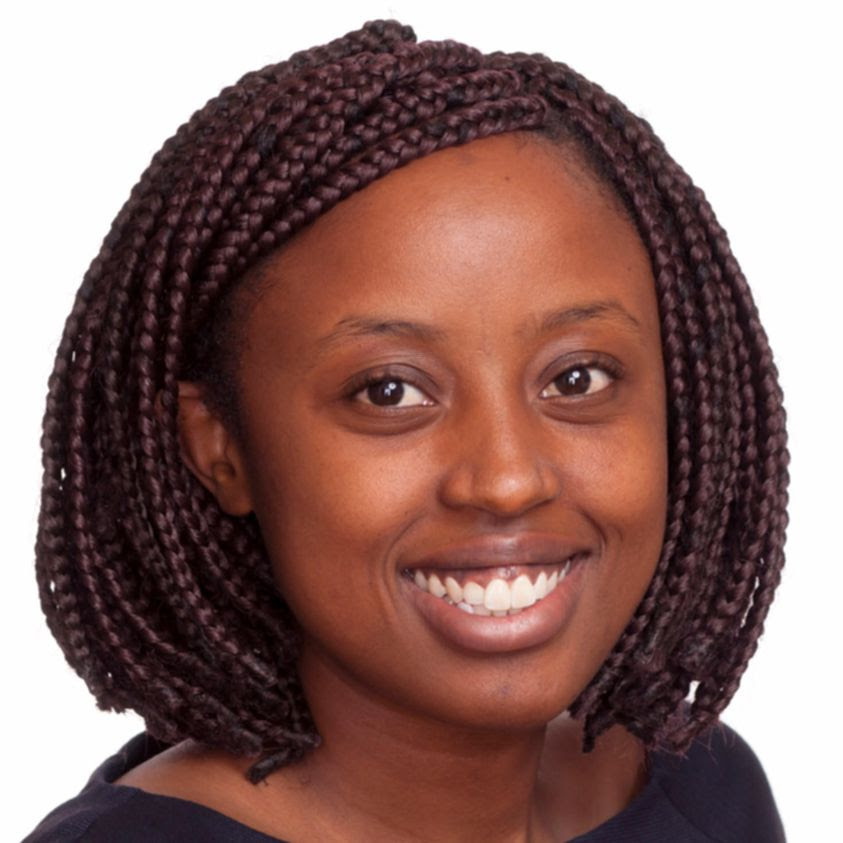 Muthoki Mumo, Committee to Protect Journalists – Africa program coordinator, based in Nairobi, Kenya
Muthoki Mumo, Committee to Protect Journalists – Africa program coordinator, based in Nairobi, Kenya
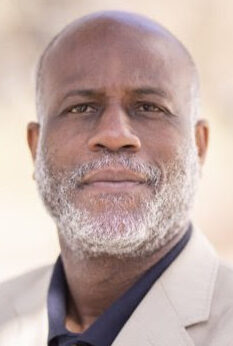 Garry Pierre-Pierre, Haitian Times – founder and publisher, Brooklyn, N.Y.
Garry Pierre-Pierre, Haitian Times – founder and publisher, Brooklyn, N.Y.
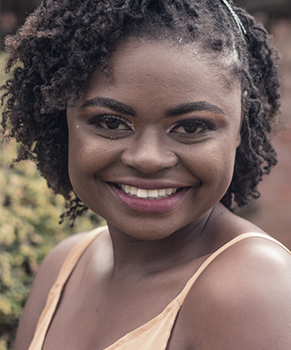 Nompilo Simanje, International Press Institute — Africa advocacy and partnerships lead, Bulawayo, Zimbabwe
Nompilo Simanje, International Press Institute — Africa advocacy and partnerships lead, Bulawayo, Zimbabwe
 John Yearwood, Politico – editorial director – diversity and culture; formerly global chair of the Vienna, Austria-based International Press Institute and world editor of the Miami Herald
John Yearwood, Politico – editorial director – diversity and culture; formerly global chair of the Vienna, Austria-based International Press Institute and world editor of the Miami Herald
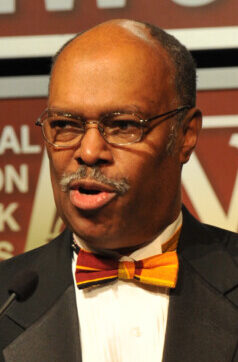 Richard Prince, Journal-isms columnist, moderator.
Richard Prince, Journal-isms columnist, moderator.
It’s not too early to RSVP to < blackruncountries (at) gmail.com > whether or not you will be at the NABJ convention.
Update:
(Credit: Wallace House/YouTube)
Exiled Haitian journalist, NABJ honoree, joining Roundtable
Roberson Alphonse, this year’s recipient of the Percy Qoboza Award from the National Association of Black Journalists, has agreed to join the special Journal-isms Roundtable Aug. 1 in Chicago on “Press Freedom in Black-Run Countries.”
“I’m honored by your invitation to join that panel,” Alphonse messaged. Commitment to “ringing the bell on press freedom, democracy in this era of disinformation, populism and the rise of authoritarian regimes is priceless. We have to deal with those issues while our profession is facing [an] existential crisis. We are in surviving mode in Haiti. It’s almost the same for local press here in the US.”
NABJ said, “This award recognizes a foreign journalist who has done extraordinary work while overcoming tremendous obstacles that contribute to the enrichment, understanding, or advancement of people or issues in the African Diaspora.
“Alphonse, one of Haiti’s most respected investigative journalists, is not only a fearless journalist but a brave soul. He survived a shooting attack in 2022 that left him wounded in both arms on his way to work at a Port-au-Prince radio station. Now a University of Michigan Knight-Wallace Fellow, he boldly continues to heal and continues his work as the News Editor for Le Nouvelliste and Information Director at Magik9.”
—
You can see a video detailing Alphonse’s story and journey to Wallace House here.
- Ajabu Adolphe, New Humanitarian: How Congolese journalists covering the M23 war are being forced to pick sides
- Committee to Protect Journalists: Three journalists disappear, 3 media outlets suspended in Burkina Faso
- Committee to Protect Journalists: Malian journalist Yeri Bocoum missing after covering banned protest (June 27)
- Global Press Journal: ‘Unwilling to Stop’: What it Takes to Be a Local Reporter in Haiti
- Mark Heywood, Daily Maverick, South Africa: The defence of journalism and journalists is a social justice issue (June 30)
- International Federation of Journalists: Kenya: Journalists attacked by police during protest in Nairobi
- Media Foundation for West Africa: Ghana’s ruling party’s thugs invade radio station, attack rival faction communicator (June 17)
- Media Foundation for West Africa: Liberia Stands at Crossroads: CEMESP [Center for Media Studies and Peacebuilding] issues call to action on World Press Freedom Day (May 6)
- Premium Times and Agency Report, Lagos, Nigeria: Nigerian govt threatens to jail whistleblowers who leak govt documents
- Radio Amazuj: Sudanese journalist released after detention in Shendi
- Reporters Without Borders: More than 70 obstacles to reporters’ work in three years: journalism at a crossroads in Senegal (June 6)
‘[btnsx id=”5768″]
To subscribe at no cost, please send an email to journal-isms+subscribe@groups.io and say who you are.
Facebook users: “Like” “Richard Prince’s Journal-isms” on Facebook.
Follow Richard Prince on Twitter @princeeditor
Richard Prince’s Journal-isms originates from Washington. It began in print before most of us knew what the internet was, and it would like to be referred to as a “column.” Any views expressed in the column are those of the person or organization quoted and not those of any other entity. Send tips, comments and concerns to Richard Prince at journal-isms+owner@
View previous columns (after Feb. 13, 2016).
View previous columns (before Feb. 13, 2016)
- Diversity’s Greatest Hits, 2018 (Jan. 4, 2019)
- Book Notes: Is Taking a Knee Really All That? (Dec. 20, 2018)
- Book Notes: Challenging ’45’ and Proudly Telling the Story (Dec. 18, 2018)
- Book Notes: Get Down With the Legends! (Dec. 11, 2018)
- Journalist Richard Prince w/Joe Madison (Sirius XM, April 18, 2018) (podcast)
- Richard Prince (journalist) (Wikipedia entry)
- February 2018 Podcast: Richard “Dick” Prince on the need for newsroom diversity (Gabriel Greschler, Student Press Law Center, Feb. 26, 2018)
- An advocate for diversity in the media is still pressing for representation, (Courtland Milloy, Washington Post, Nov. 28, 2017)
- Morgan Global Journalism Review: Journal-isms Journeys On (Aug. 31, 2017)
- Journal-isms’ Richard Prince Wants Your Ideas (FishbowlDC, Feb. 26, 2016)
- Richard Prince with Charlayne Hunter-Gault, “PBS NewsHour,” “What stagnant diversity means for America’s newsrooms” (Dec. 15, 2015)
- Book Notes: Journalists Follow Their Passions
- Book Notes: Journalists Who Rocked Their World
- Book Notes: Hands Up! Read This!
- Book Notes: New Cosby Bio Looks Like a Best-Seller
- Journo-diversity advocate turns attention to Ezra Klein project (Erik Wemple, Washington Post, March 5, 2014)

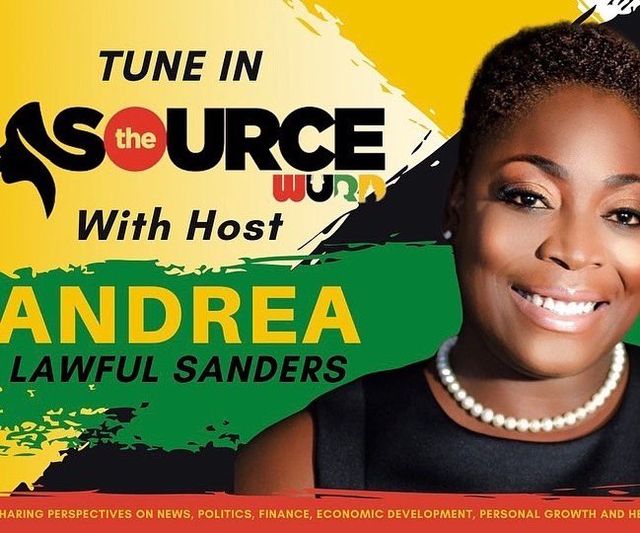
13 comments